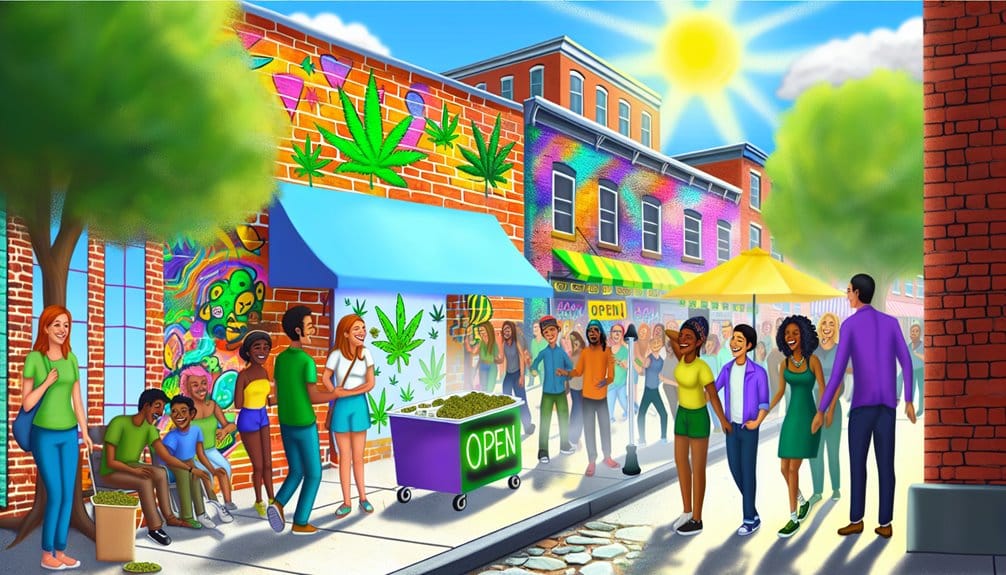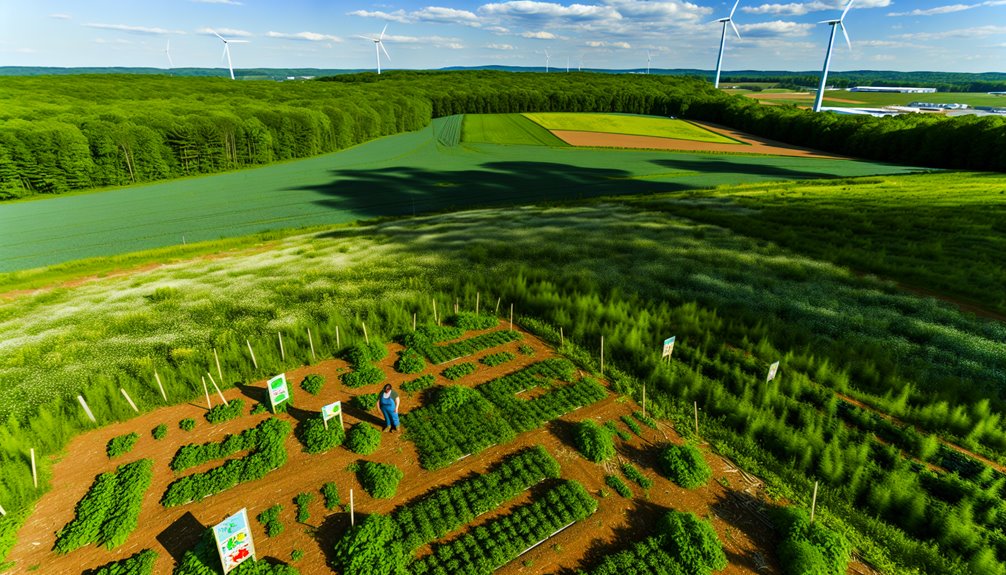Consider this – since legalizing marijuana, Maryland has raked in over $22.3 million in sales tax revenue alone. It's like finding a pot of gold at the end of a rainbow. But it's not just about the money. The legalization has also led to the creation of over 15,000 jobs, changed the face of criminal justice with automatic expungements, and influenced a shift in social attitudes towards cannabis use. As we unpack each of these impacts, you'll see it's more than just a green rush; it's a revolution in society, economy, and justice.
Understanding the New Marijuana Legislation in Maryland

In 2022, Maryland voters overwhelmingly approved the Maryland Question 4 referendum, leading to the legalization of recreational cannabis use. This seismic change in marijuana possession laws states that adults 21 and over can possess up to 1.5 ounces of cannabis flower. However, possession over this limit could lead to fines or even jail time, depending on the amount. The new legislation also includes a provision to start accepting new cannabis business license applications from mid-November 2023, with a stipulation for social equity ownership of at least 65% required for applicants. The law also allows for cannabis cultivation regulations, where adults can grow up to two plants privately. Additionally, the new law has a profound impact on those previously charged with possession, as it provides for automatic expungement and allows resentencing for those convicted. It's essential that you understand these changes to effectively serve your community within this new legal framework.
The Economic Impact of Legalizing Marijuana in Maryland
Since the legalization of marijuana, Maryland's economy has seen a remarkable transformation. The economic benefits are numerous, as evidenced by the wealth of data available.
- In Q2 2024 alone, over $22.3 million in cannabis sales tax revenue was collected. This not only indicates a booming market, but also contributes considerably to state funding for education, infrastructure, and health initiatives.
- This thriving industry has created an abundance of job opportunities, supporting over 15,000 jobs ranging from retail to farming and logistics.
- Maryland's cannabis industry has proven its capacity for economic growth and investment, with total sales hitting the $1 billion mark.
- Finally, the emphasis on social equity licensing and community reinvestment showcases the industry's potential to drive growth while prioritizing inclusivity and diversity.
- Furthermore, the state has dedicated a portion of the tax revenue to help marginalized communities and promote equity. Specifically, 5% of quarterly sales tax revenues are allocated to aid small, minority-owned, and women-owned businesses (5% of quarterly sales tax revenues).
Your support in this transformative industry aids not just the economy, but the community at large.
Changes in Law Enforcement and Criminal Justice

While we've seen the economic benefits of marijuana legalization in Maryland, it's just as important to address its impact on law enforcement and criminal justice. You'll notice changes in vehicle searches and field sobriety tests. The smell of marijuana alone can't warrant a search anymore, reducing racial profiling. Police training now focuses on detecting impaired driving, as other states have seen a rise in such incidents post-legalization. Law enforcement faces recruitment challenges due to prohibitions on marijuana use. Community outreach involves expunging past possession charges, positively impacting African American communities most affected by these convictions. The aim is to mitigate long-term effects on employment and education. Policymakers are working to balance public safety and individual freedoms.
The Healthcare Implications of Marijuana Legalization
Shifting our focus to health care, legalization of marijuana in Maryland has brought a myriad of implications. You've witnessed a surge in cannabis-related emergency department visits, especially among the 20-29 age group. The data suggests a link to increased usage or a decreased stigma in reporting use.
- Healthcare access has expanded, diverting more patients to the emergency department.
- Treatment programs need to address accidental ingestions, especially in children, due to the proliferation of unregulated products.
- The state's health department has risen to the occasion by launching a data dashboard to monitor public health impacts, facilitating data-driven decisions.
- Educational campaigns are now essential to mitigating adverse health outcomes and promoting safe storage practices.
Despite legalization, a vigilant approach is needed to navigate these healthcare implications effectively.
Shifts in Social Attitudes Towards Marijuana Use

Delving into the shifts in social attitudes towards marijuana use reveals a complex tapestry of public opinion. You'd notice a clear generational divide, with younger generations showing stronger support for legalization due to perceived economic and criminal justice benefits. On the other hand, older adults exhibit more caution, highlighting concerns about community safety and potential substance misuse. Some racial disparities also exist, with white Democratic voters generally showing more support than Black voters. However, shifting perceptions across all demographics indicate a growing cultural acceptance. Still, some discrepancies persist like wealthier suburbs showing more support than urban areas. Such nuances underline the importance of understanding the diverse standpoints in shaping future policy discussions.
The Influence on Maryland's Employment Landscape
Moving away from societal attitudes, it's also important for us to explore the influence of marijuana legalization on Maryland's employment landscape.
- Current employer policies allow for marijuana testing, and adverse actions based on positive results. However, labor market considerations may prompt reevaluation of these practices.
- Proposed legislation could prohibit employers from penalizing off-duty marijuana use, protecting personal liberties while maintaining workplace safety.
- The changing landscape pressures employers to reconsider their testing policies, with some already abandoning routine marijuana tests to attract and retain staff.
- Traditional testing methods struggle to accurately determine workplace impairment. New technologies, measuring actual cognitive performance, may offer more accurate insights.
Environmental Concerns and Marijuana Cultivation

Despite the societal and economic benefits of marijuana legalization, it is crucial to reflect on the environmental implications of cannabis cultivation. Your efforts in sustainable cultivation can greatly mitigate these impacts. Be aware that marijuana farming often diverts water, altering aquatic ecosystems and stressing local wildlife. Adopt efficient water conservation practices, such as drip irrigation with moisture sensors, to minimize consumption. Energy use is a concern too, with indoor cultivation straining the electric grid. Optimize energy use, perhaps by shifting from reverse osmosis water treatment to regular tap water. Land use issues arise from forest clearing and erosion, so promote sustainable land practices. Finally, manage waste responsibly to prevent pollution. Embrace these practices to align your cultivation efforts with environmental preservation.
A Look at the Future: Predicted Long-Term Effects of Legalization
As we peer into the crystal ball of Maryland's future, we can't overlook the profound long-term impacts of marijuana legalization. These future forecasts are based on careful analyses and present trends, and they demand your attention.
- Long-term health: More potent cannabis strains are linked to cannabis use disorder and mental health issues, especially in young adults.
- Addiction trends: The rise in cannabis-related emergency visits and poison center calls hint at increased usage and addiction risks.
- Social and legal adjustments: Continued efforts to address social inequities and legal implications related to past cannabis laws are anticipated.
- Economic growth: Expect continued growth in tax revenue, job creation, and industry expansion, serving communities disproportionately affected by past laws.
Conclusion
You've journeyed through Maryland's green revolution, where pot legalization is not just blowing smoke. It's a gold mine, pumping over $22.3 million into the economy and creating 15,000 jobs. Legalization is no longer a pipe dream; it's rewriting social norms, healing past injustices, and seeding opportunities for social equity. Yet, it's not without its thorns, raising new health and environmental concerns. As we look to the future, the full impact remains a budding question.
If you're curious about how this change affects you or if you want to explore the benefits of cannabis further, I invite you to visit Fells Point Cannabis Docs of Maryland. They have a wealth of information and resources that can help you navigate this new landscape. You can also call them at (410) 401-4200 to chat with their friendly staff. They're eager to answer your questions and provide guidance in a welcoming environment. Let's embrace this exciting journey together!

